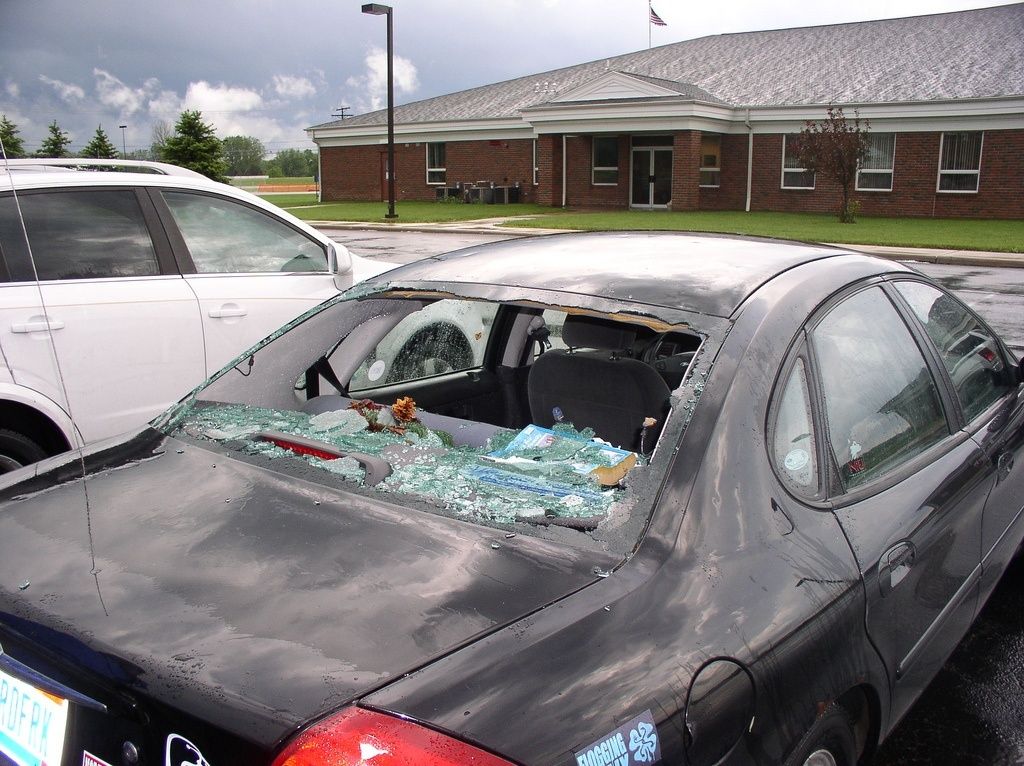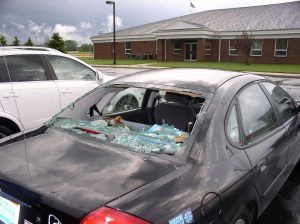
Most Americans Can't Pay for Car Repairs, 4 Tips to Help
According to a recent survey by AAA, 62 percent of American drivers would not be able to pay $2,000 for car repairs without going into debt with a credit card or asking for money from friends or family. While the savings rate is positive, it’s not common for consumers to put aside a portion of these savings specifically for car repairs. Many New York residents are likely dealing with this issue right now. Just a few days ago, a hail storm tore through some areas of Queens and Long Island. Social networks like Facebook were buzzing with videos of the storm as well as photographs of tennis ball-sized hail and the resulting damage.
Banking Deal: Earn 1.55% APY on an FDIC-insured money market account at CIT Bank. See details here. CIT Bank. Member FDIC.Comprehensive insurance typically covers this type of damage, but not everybody has comprehensive insurance. The survey’s results suggest that 20 percent of drivers needing $2,000 for repairs like windshield and body damage caused by hail will put the repairs on a credit card because they don’t have the money in a bank account while 11 percent will be asking around for help or taking money out of their home equity or retirement accounts.
 There are a few approaches to take to help prepare a household’s finances for a car repair emergency. For the most part, it’s the same as preparing for any emergency. There are a few tactics related to cars that would be helpful to consider.
There are a few approaches to take to help prepare a household’s finances for a car repair emergency. For the most part, it’s the same as preparing for any emergency. There are a few tactics related to cars that would be helpful to consider.
- Buy low-value cars. There is a strong case for buying well-used cars at great prices. Owning old cars are possible and worthwhile, particularly if you don’t need to drive excessively and you responsibly maintain the car’s performance. When Mother Nature or a crazy drunk driver brings damage to your old car, you don’t feel as great a loss as you would if the same damage afflicted a new car.
- Buy new or late-model used cars. The typical advice experts offer is to avoid brand new cars because a new car loses the most value the minute you drive it off the dealer’s lot. Depreciation is mostly irrelevant if you own the car forever, though. Then again, many people who plan to own their new car forever and use this as a rationalization for buying a used car don’t accurately predict their predictions several years in the future.
- Continue making “car payments” to your savings. If you do buy a car and have an associated car loan, once you make your last payment, start transferring the same amount to a designated savings account. For example, if you’ve been paying $300 a month for the past five years for your no-longer-new car, rather than increasing your spending once you’ve paid off the balance of the loan, start depositing a monthly $300 into a high-yield savings account. Many banks let you customize the name of your account, so every time you transfer money, you’ll remember that it is designated specifically for your “Car Repair Fund.”
- Consider comprehensive insurance. Unlike liability insurance, which covers the damage you cause to other vehicles, the type of insurance that covers damage caused by nature or an unidentified individual is not required. Lenders may require comprehensive insurance during the life of the loan, but once you own the vehicle without debt, you can remove comprehensive insurance. It may be worthwhile to continue the insurance anyway, particularly if the value of the car is still greater than the cost to repair typical damage. It may be cheaper to self-insure — using the technique in the bullet point above — but continuing insurance is a valid option.
Are you financially prepared for damage to your car?
Photo: Dakota Kingfisher
AAA


Article comments
when you are on disability and have 13 drs there is no way to have savings for emergencies.In one month my transmission went out, my air conditioner leaked putting a 5ft by 6ft hole in my mobile home floor,went in for surgery and the dr messed up my anesthesia and couldnt operate
I sometimes wish we were living in the 1980s. Cars were easier to work on… few cars were run by computers and electronics (which are always costly in repairs). Back then we didn’t have all the extra bills we have today, like cell phone, cable, internet. It was just rent and electric basically. All this stupid entertainment has caused us to put our money on stuff that has no real value. My wife’s Nissan Maxima (2005) just had to get some new break calipers ($420) the air idle controller goes out a week later ($560) and two days later the electronic module goes out ($1,200). I am so upset right now because most of that was our summer vacation money we had planned to use for an out of state trip in July. Now we are stuck home and I’ve been having thoughts about selling the vehicle to get a low mileage car from 1980-85. I can work on those cars at home without having to go to a mechanic and most parts are pretty cheap that if anything goes out, it won’t hurt our wallet.
These statistics are incredible. I didn’t know that it was quite that bad. This proves that there has never been a bigger need for a fully funded emergency fund. That would eliminate all of these problems if people had one to fall back on.
i am prepared, only because i currently do not have, or need, a car.
When we first started getting our finances in order we would take out $10.00 a week and put it in the bank for car repairs. We both drove older cars and knew that we would need it one day. I helped us to be accountable to each other.
This is exactly the situation that I find myself in, and I am not prepared. Too bad comprehensive doesn’t cover a new transmission.
In answer to the question, yes, we are prepared. We generally have enough cash savings to cover any sort of temporary emergency (which we’ve never had). Sometimes, we empty all our cash into investments, such as this month when we’re trying to buy 2 investment properties. However, even if all of our savings end up spent, we save enough each month that by the time the credit card bill came due, we’d have enough to pay it off (for any reasonable amount of damage).
I’d be able to cover some of the damage without insurance. Luckily i have Comprehensive coverage and have enough to cover the deductible. My guess is a lot will cover the windows and not take care of the dings and dents from the hail.
We recently had to shuck out $700.00 in maintenance for, and repairs to, our ’04 Prius. Since the repairs were unexpected, we needed the car immediately for a long-planned trip with friends, and it takes two days to transfer funds out of our high yield savings account, we had to go bass-ackwards and put the repairs on our credit card. I immediately started a savings goal for the amount of the repairs with a deadline to have the money saved and transferred to my checking account by the time the credit card statement arrives later on this month. Not a highly recommended route, but sometimes this is the only way to go to get the repairs you need for your car without racking up credit card debt.
If you have the money in your savings account, but just couldn’t access it to pay cash quickly enough, why is it any problem at all to just put it on the CC bill, transfer the money, and use it to pay your CC bill when due a month later (without incurring any interest or penalty)? This seems like it should be the DEFAULT method. Especially if your card has any type of rewards whatsoever. In fact you also get an extra several weeks’ worth of interest accrual in your savings account.
@Jonathan, that’s pretty much what we’re doing, except that the repairs were unexpected and we didn’t have a car repair fund at the time, but we will have the money saved up by the time the bill comes in. : ) We recently became debt free and don’t want to use our credit card unless it’s a true emergency/unavailability of cash due to transfer times.
It’s difficult to budget already with paying car insurance/cell phone/cable/electricity and then dealing with car repairs. I would have to put any money for car repairs on my credit card.
I like the first bullet. I do this, but never thought of it the way you presented it. I have full coverage on my vehicle, but a higher deductible. So when I got in my car last week and saw what I thought was a stress fracture in the windshield, it was fully covered. It turned out someone etched a long line on the driver’s side.
Just a bit of a correction. Comprehensive insurance covers damage to your car which is not caused by hitting something. Collision covers damage to YOUR car when you hit something and it’s your fault. And liability covers damage to the other person’s car when the accident is your fault.
You’re right of course. Liability is the required type of insurance.
I always wondered what Comprehensive coverage really meant. Thanks for the info!
I hit a deer and it was covered under comprehensive. I was not considered ‘at fault’ and therefore did not receive a ticket or demerits on my insurance.
It is hard to prepare when there is barely enough for the other monthly bills. If it requires extensive repairs, I am prepared to do without the car.
Yes, I know I’m prepared. Most cars and trucks should not be considered liquid assets, especially if it’s your primary or only transportation. There are so many of us that live in suburbia that selling our transportation in a liquidity crisis is out of the question. Walking to and from a grocery, 2 miles away, buying only what you can carry – in winter? Not! There are also other decision points along the way. As I looked at your picture and wondered – I know I would have replaced the window at let the body damage stand as is. Mainly because I believe that if you define yourself by the type or condition of your transportation, you need to tighten your depth-of-field and refocus. I have my main transportation and a pick-up (I think having a pick-up is required by law in Missouri) even though I’m retired. One would be repaired to the extent necessary to provide transportation; the other would be listed on my tax return as a loss if it didn’t make sense to repair it.